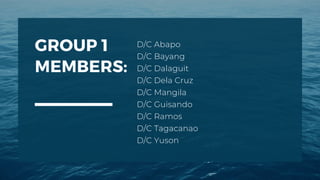NAV-GROUP-1-FINALs-WEEK 1.pptx
- 2. D/C Abapo D/C Bayang D/C Dalaguit D/C Dela Cruz D/C Mangila D/C Guisando D/C Ramos D/C Tagacanao D/C Yuson GROUP 1 MEMBERS:
- 3. ? Demonstrate the different methods on how to monitor the planned voyage with the aid of computer-related information on the voyage planning. ? Demonstrate the correct use of logbooks including its legal-related documents in the preparation and monitoring of voyage Intended Learning Outcome:
- 4. ? The Deck Log Book, is a prime piece of document that has in its record all actions that are undertaken in the bridge. ? The logbook used to record various data, scenario, and situations (including emergency situation and action) which are later used for reference, case study and for marine insurance purpose in case of damage to the ship or loss of shipˇŻs property should be properly filled without any errors. Intended Learning Outcome :
- 5. ? The position of the ship in Latitude and Longitude at different intervals. ? Time to be noted when Navigation marks are passed ? Time, details and reason if there is any course alteration ? Meteorological and weather conditions including details of sea, swell etc along with the Beaufort scale that is prevalent Following are the entries which must be filled up by the Deck officer during his/her watch:
- 6. Following are the entries which must be filled up by the Deck officer during his/her watch: ? Movement of the ship at sea including rolling, pitching, heaving etc ? Details of any abnormal condition ? Speed of the propulsion engine and speed of the ship in knots ? If involved in any kind of accidents like stranding, grounding etc. then details
- 7. ? If there is an oil spill or other pollution accident, position of the ship, time and complete incident to be recorded ? Record of general watch routines performed including fire watch ? Time of arrival and departure and ETA. ? If berthing or anchoring is planned, time for the same to be noted. Following are the entries which must be filled up by the Deck officer during his/her watch:
- 8. Following are the entries which must be filled up by the Deck officer during his/her watch: ? Entry to be made if any physical contact with floating object or vessel is made ? Details of the distress signal received ? Entry for what kind of assistance is given to the distress signal sender ? If salvage operation is performed, complete details to be entered
- 9. ? Heading and Compass error ? Drills and training carried out as well as inspections with regard to stowaways and security-related measures ? Record of stores, fresh water etc received Following are the entries which must be filled up by the Deck officer during his/her watch:
- 10. ALSO, ANY OTHER ENTRIES AS REQUIRED BY MASTER, COMPANY, AND ADMINISTRATION SHOULD ALSO BE RECORDED IN THE LOGBOOK WITHOUT FAIL.
- 11. Additionally, ? An original page should never be removed from the Logbook. This is because the Deck Logbook is used as official evidence in case of an unfortunate event ? Only official designations and symbols to be used ? If there is insufficient space in the Remarks section, insert a gummed paper strip instead of making the logbook clumsy. This shouldnˇŻt be necessary as there is ideal space to record everything in precise language
- 12. ? Remember that the logbook entry carries the OOWˇŻs signature which means that the OOW is responsible for all that is recorded by him which is a mark of his competency and accuracy of the data that is entered.











